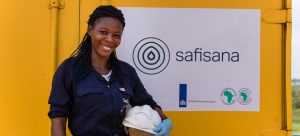
On International Women’s Day, we want to celebrate inspiring women in the water and sanitation sector, like Gloria Annor. Gloria is Plant Supervisor and one of Safisana’s longest-working employees in Ghana. About 12 years ago, Gloria started as an operator of the toilet block and waste collector at the market. Since then, she has climbed up the career ladder all the way until she became a team leader. And her ambition and dreams for the future have not stopped.
When did you start working for Safisana?
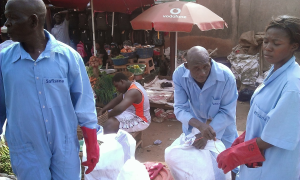
I have worked for Safisana since 2010. I was 21 years old and had finished high school in the Ashaiman community. My childhood dream was to become a police officer. After high school, I tried to get into police education but I could not get the chance. That’s when I got in touch with Safisana through my father. He was a farmer and the secretary of the farmers’ association at GIDA (Ghana Irrigation Development Authority) in the Greater Accra Area. He heard about the pilot Safisana was running in this area and that they were looking for people.
Do you still remember your first day at Safisana?
For sure. On my first day at Safisana, the pilot site opened. Safisana was a very small company still in the pilot phase. We were a team of only 5 people. Two people in the Netherlands, Aart, the Managing Director, and Jos, the Technical Engineer. In Ghana, we were three: a Production Manager, a Senior Manager and me.
What did your first job entail?
I started as a sales girl and collected the revenue at the Safisana toilet block. People in the neighbourhood had to pay a little fee to use the Safisana toilet block. Besides, I also worked as a waste collector at the local market, collecting food waste to put in the digester to produce renewable energy.
What did you like about working with Safisana?
I like the people and what we do. Safisana’s goal is to help the community. That is a wonderful job. The community is benefitting from what Safisana is doing. Recycling of waste impacts the community. We improve sanitation and educate people not to defecate openly. By collecting organic waste and faecal sludge, we help to clean up the place, and this gives us electricity. The concept of using waste to produce electricity, that is such a great idea! I am proud to be part of it. The biggest lesson I learnt at Safisana is that waste can be turned from something bad into something good for the community.
“The biggest lesson I learnt at Safisana is that waste can be turned
from something bad into something good for the community.”
Are you are part of that community?
Yes, I was born and raised in Ashaiman. I live a 30-minute walk from the Safisana plant, together with my mother, who is a trader. She sells bananas, plantain, and cassava. My father passed away. I am the oldest of one sister and four brothers. One of them, Justice, is also working at Safisana for many years. He cannot hear but despite that, he managed to become a full-time plant operator in the composting team. And last but not least, I have a daughter. She is four years old and wants to become a soldier when she grows up!
She will be working in a man’s world, just like you! After some time as a sales girl, you were promoted to a technician. How did that happen?
That happened quite by accident because the manager taking care of quality control suddenly stopped. Since there was no one else around who could pick it up, I stepped in.
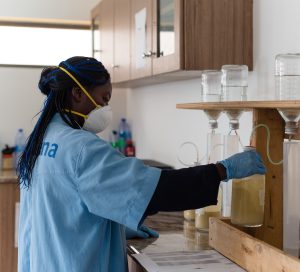
How did you learn to be a technician?
I was trained by Jos on how to do measurements on-site and collect operational data. I started running lab tests to check the quality of the inputs and outputs of the recycling process, which are the waste that is fed into the digester and the end product, our compost. Between 2016 and 2022 I gradually grew into that job and became a full-time lab assistant together with Simon, our Quality Control Manager.
When did you become Plant Supervisor?
As part of my personal development plan, I did a training on how to supervise in 2020. That’s where I learned a lot: how to lead people, how to talk to my bosses, and how to have empathy and sympathy towards my colleagues at work. I found it all very inspiring. In 2022, the production team was divided into smaller and more specialised teams for waste treatment, energy production and composting. I was promoted to supervisor of these three teams.
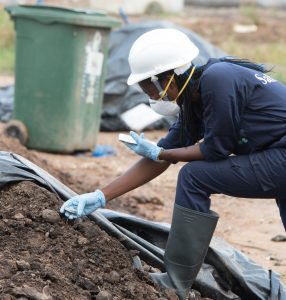
What does a regular working day look like?
I oversee the day-to-day activities of around 15 people. I usually start at 8.00 am with a staff meeting where we discuss what we need to do on that day. Afterwards, we will move to the field. I make sure that everyone does what is needed and that processes run smoothly. I make sure the CHP ( generator) is running where the electricity is produced. I make sure all data is collected correctly etc. Then I usually move to the lab to do some analysis. In the afternoon, I take care of some administrative tasks.
What achievements are you most proud of?
We have more people supporting Safisana’s idea. This has led to many improvements in the production processes. When we started, we did not have enough machines like a bobcat and a compost turner. Now we have them, which makes work easier. We have built a roof over the composting area to protect the people from the scorching sun and the compost from the rain. With the concrete floor, there is less sand in the compost. So, we have come a long way!
As a female supervisor, surrounded by men, what are the main challenges in your job?
Not many with the team. I like working with the field leads and that they listen to me. I also allow them to grow and supervise. Just like my managers recognised my quality as a supervisor, I do the same with the younger team members. I don’t want to be the only one supervising. In the case that I am not around, they should be able to cope and make sure that everything is in place.
The most important thing is to understand people’s backgrounds. Some people come from poor backgrounds and are not very educated. You need patience to talk to them and to align, so they can understand what they need to do.
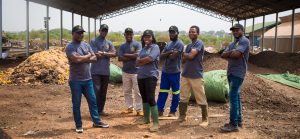
What does the future look like ten years from now?
For me or for Safisana? For myself, – please write that down – I want to be a manager at Safisana one day, the plant’s Senior Manager. That is what I am working towards to. I have been very lucky that my managers have recognised my quality as a supervisor. At Safisana, I have always had many chances to grow and learn. So I am very motivated.
And for the company? I want to see Safisana all over the place. Everywhere you go, you should see ‘Safisana’, ‘Safisana’ – yeah!”
This is the second story of the series “We are Safisana!”, which will be published in two parts. Part 1 includes two stories that were produced in collaboration with Safisana. Part 1 will be published on Aqua for All’s website. Part 2 will be published on Safisana’s website.
Read the interview with Aart van den Beukel, Managing Director at Safisana.